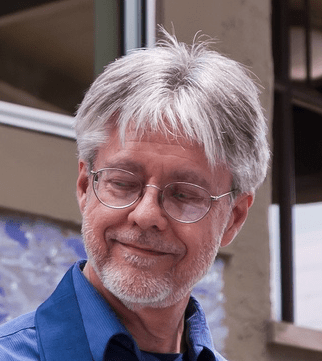
We Eat This Meal
October 1, 2021
 by George Mukei Horner
by George Mukei Horner
The Meal Chant
Let us reflect on the efforts that brought us this food, and consider how it comes to us.
Reflect on our virtue and practice, and whether we are worthy of this offering.
Regard greed as the obstacle to freedom of mind.
Regard this meal as medicine to sustain our life.
For the sake of enlightenment, we now receive this food.
First, this food is for the Three Treasures.
Second, it is for our teachers, parents, community and all beings everywhere.
Third, it is for all beings in the six realms. Thus, we eat this food with everyone.
We eat to stop all evil,
To practice good,
To liberate all beings,
And to accomplish the Buddha way.
We begin our meals together with these words. They serve to settle us, to orient us in what we are about to do, to set our intention for why we eat, and to remind us that, no matter where we are or whatever the circumstances happen to be, we never eat alone.
We recite these words before serving ourselves Sunday lunch in the Sangha House. And in oryoki meals during sesshin and zazenkai, we recite them after being served the meal, just before we begin to eat. But even though the very first line calls us to reflect and consider, reflecting upon and considering the larger context in which we eat is not easily done while chanting. And, of course, once the meal begins, we are eating, and attending to what is before us.
So let’s begin by noticing that the meal chant is composed of two verses. The first five lines are known as The Verse of the Five Contemplations. Its current wording expresses the character of our practice today at a city Zen center, but for many years at ZCLA we used a version that recalls the monastic origins of this text. Let’s imagine ourselves in the dining hall of a Zen monastery chanting, in the phrasing we once used,
First seventy-two labors brought us this food; we should know how it comes to us.
These seventy-two labors are the seventy-two named service positions in a Zen monastery, where they grew their own food and were largely self-sustaining. Everyone in the dining hall would have known where their food came from, all the effort that went into preparing it, and everything that went into maintaining the monastery as a functioning place in which to practice. These words call them to remember that it is through the efforts of the whole community that they are sharing this meal.
For us, when we say, Let us reflect on the efforts that brought us this food, what does that call to mind? In our world today, truly, it could be almost anything. Our economy is unprecedentedly global. Not just the devices we use and the clothes we wear, but the food in our bowls may come from hundreds of miles away, or halfway around the world. How many unknown tasks on the part of how many people who will never know each other, had to come together to make that possible?
Consider how it is that we, this particular group of people sharing a meal, have come together in this time and place to do this. All the myriad paths our lives followed—and didn’t follow—that led to us being here with each other, in this moment. Likewise, consider all the paths our ancestors’ lives took, all the choices they made or did not make, that led to us being here at all. And what of the choices we and our ancestors have made collectively, as a community, as a nation, as a people, however we define those terms? How do they manifest at this meal?
Every one of these strands of personal, communal, national, and global karma, come together and are present in and with us as we sit down with this meal. We should know how it comes to us, even while we know that we can never know.
Second, as we receive this offering, we should consider whether our virtue and practice deserve it.
We live and practice in community with others, and have vowed to continually realign our conduct to accord with the precepts. Without indulging in the unhelpfulness of guilt, just notice where we need to realign and set our intention to do so.
Third, as we desire the natural order of mind to be free from clinging, we must be free from greed.
Be balanced in what we want, and mindful in what we take. Where the amount is limited, as it is in the dining hall, the more we take for ourselves, the less there is for those yet to be served.
Fourth, to support our life, we take this food. Fifth, to attain our way, we take this food.
We eat to support our own life. We eat to support the life of others.
The second section of the meal chant is known as The Verse of Raising the Bowl. During oryoki, it is at this point that we place our spoon in the Buddha bowl, and our chopsticks across the middle bowl, then raise the Buddha bowl and say,
First, this food is for the Three Treasures.
How do we understand the Three Treasures of Buddha, Dharma, and Sangha? They are, of course, Shakyamuni Buddha, the understanding of life to which he awakened and that guided his teaching, and the community of practitioners who joined him in seeking to live the Way.
But they are also the ongoing stream of the Way from the Buddha’s time right down to us, all the teachers, all the practitioners and their communities, all the insight and understanding they shared with each other, and which we share with each other as we grow and mature in the Way, as well as the precepts with which we guide our lives.
More deeply, the Buddha Treasure is the seamless oneness of life, in which none of us is separate from anything else, in which your being and my being are vast, including everything, even each other. The Dharma Treasure is the diversity of life, the distinctness and particularity of each aspect as it reveals itself just as it is, so that this aspect and that aspect, this being and that being, are not the same, even while part of a seamless whole. The Sangha Treasure is the harmony with which this diversity-in-oneness, this oneness-in-diversity simply is the nature of life. The Three Treasures are what our life truly is.
Second, it is for our teachers, parents, community, and all beings everywhere.
Having reflected on how this food comes to us, we eat in gratitude for all the efforts of our dharma ancestors, and our family ancestors, and everyone in every community of which we are a part, together with all beings, past, future, and present. It is due to their efforts that we are here and able to give our own efforts, in turn, in the service of others.
Third, it is for all beings in the six realms.
The six realms are those of heavenly beings, fighting spirits, human beings, hungry ghosts, animals, and beings in hell. Traditionally, these are regarded as the realms into which one can be born, live, die, and transmigrate after death to be reborn as a new life. In Zen, they are especially understood as the many places we go in our minds, over and over, in endless permutation, countless times in each and every day. In recognizing that, we recognize the possibility of being freed from that.
Thus, we eat this food with everyone.
This is what the preceding three lines have just said. First this way, then that way, then another. And just in case we missed it, it says it one more time in words that can’t possibly be misunderstood: We eat this food with everyone.
We eat to stop all evil,
To practice good,
To liberate all beings,
And to accomplish the Buddha way.
In these words, we recognize together, the Three Treasures, the Three Pure Precepts, and the Three Tenets of the Zen Peacemakers, reminding us that we do not eat just to sustain our own individual life.
We eat to refrain from evil by practicing the Not-knowing that allows us to see clearly and live out of the Oneness that is the awakened nature of all beings.
We eat to practice good by Bearing Witness, recognizing in Diversity the ocean of wisdom and compassion, treating all beings with respect and dignity, and allowing ourselves to be touched by the joys and pain of the world.
And we eat to do good for others by practicing Healing, embodying the Harmony that is the seamless interdependence of the Oneness and Diversity of our life in this world, and acting to heal ourselves, the earth, humanity, and all creations.
With this we begin our meal, knowing that wherever we are and whatever the circumstances, we do not eat alone. We eat this meal with everyone, and to accomplish the Buddha way together.
Preceptor Mukei is our Zendo Steward.
